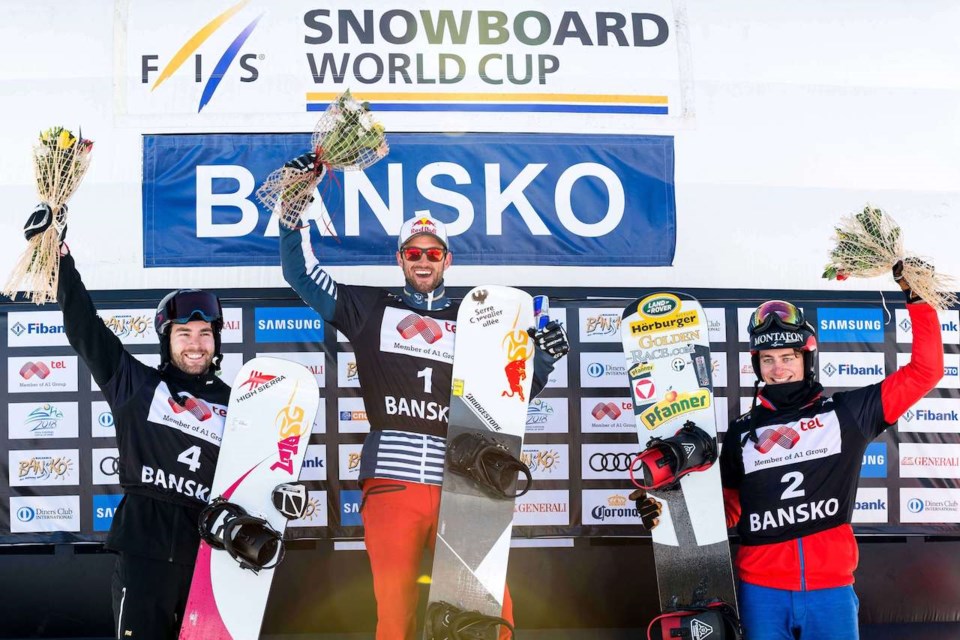Among Chris Robanske's proudest accomplishments in a decade on the national snowboard-cross team was the resilience he displayed in bouncing back from two significant injuries early on in his career.
But a serious knee injury suffered at the 2018 Winter Olympic Games in South Korea, including a Grade IV dislocation, full ACL and LCL ruptures, a medial meniscus tear, near-loss of the lateral meniscus and blowing out three centimetres of lateral cartilage, proved to be too much for the Calgary native and Squamish resident to overcome.
The 30-year-old Robanske announced his retirement on May 28, closing a career that included two FIS World Cup wins and five other podium finishes. Ultimately, when he returned to snow this past winter after 22 months of rigorous rehabilitation, Robanske was still a ways away from where he needed to be to return to international competition, deciding that continuing was not worth the risk to his long-term wellness, especially considering he is already anticipating a knee replacement down the line.
"There's only so much you can put your body through. I wanted to keep going, but at the end of the day, it's the best call for the long term," he said. "My knee is not that bad for day-to-day activities. I can still go mountain biking. I can still walk around.
"Getting to that elite athlete, high-performance level is a pretty big ask right now."
Robanske said he knew the injury at PyeongChang was a bad one after being carried off on a stretcher and receiving MRI results about an hour after the test.
"Essentially, we knew the severity of it. It didn't look good. It looked like there was going to be a lot of work done and we knew that the rehab was going to be long and slow," he said on May 29. "Even that first week, it was very much, 'Making a comeback is going to take everything I have and it's going to be very difficult. Even when I do come back, it's going to be extremely risky.'"
Robanske's first several months of recovery were challenging, not only from a physical perspective but also because he saw other athletes return to action more quickly while his own progress was much slower.
"I was limited even in walking to my car or going to the grocery store," he recalled. "It got slowly better over that full year, but what you could say is a normal ACL injury, people are back up and at it six to nine months later. It took me 12 months before I could comfortably walk for 20 minutes, half an hour."
In January 2019, Robanske enrolled for business classes at Capilano University to help further his education while also allowing him to set new goals with athletic achievements set aside.
In his career, Robanske looks back fondly at his first World Cup win, achieved at Ontario's Blue Mountain in 2013.
"That was incredibly special because I had some family there. It was a home race for Canadians and my first victory," he said. "All the stars aligned and it was a really special day."
It came after two substantial injuries, a back fracture he sustained at the 2011 X Games and a broken ankle requiring surgery in January 2012.
Robanske settled in North Vancouver that summer, making a greater commitment to the team, and enjoyed his best season in 2012-13 with two podiums, including the win. He qualified for the Olympics in both 2014 and 2018.
Robanske moved to Squamish in the spring of 2015, and coming to the "ultimate playground" for adventure athletes was another milestone in his career and he plans to call the community home for years to come.
"I've become a more well-rounded athlete since I've been out here," he said. "Mountain biking is almost a bit more similar to skiing in your body position in that you're facing forward down the hill, but for snowboard-cross specifically, because it's teaching you to always look ahead for smooth and fast lines. You learn a lot about how to finesse your bike, just line on your snowboard.
"In snowboard-cross, it's really important to have that very delicate touch and plan everything ahead."
Other benefits, he said, include running up the Sea to Summit Trail and taking the Sea to Sky Gondola down.
After a year studying at Capilano, Robanske subsequently transferred to Royal Roads University in March to enjoy more of an applied learning environment.
With a way to go before graduating from the two-year program, Robanske isn't exactly sure what his future holds. However, he still wants snowboarding to be a big part of his life, possibly in a role with Canada Snowboard.
"I expressed some serious interest in continuing to work with the team, whether that's on- or off-snow — it's undecided as of now, especially with everything going on," he said. "I want to help my teammates, help my fellow athletes, help everyone get the best out of themselves throughout the program."




